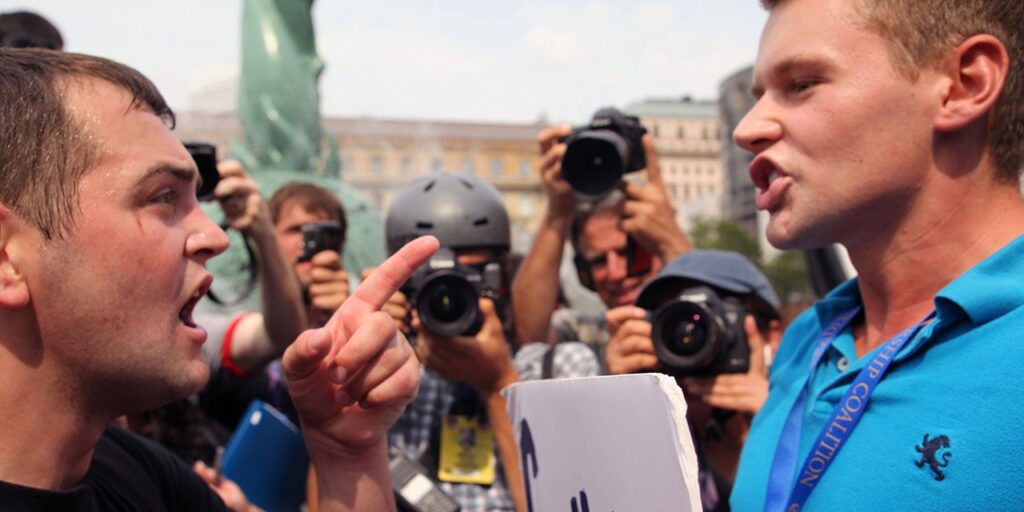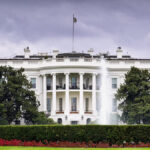
Published October 20, 2023
Several commentators have claimed recently that the era of “hyperpolitics”—described by Ryan Zickgraf in Compact as the sense that “Suddenly, politics was Everything Everywhere All At Once”—is ending. Having consumed all the emotional oxygen in the room, the phenomenon, “driven by charismatic influencers and digital demagogues—not established institutions,” has finally burned itself out, leaving the American body politic exhausted. But were charismatic leaders and demagogues responsible for our polarization, or was it established institutions, feeling themselves under threat, that initiated the new dynamic? If the institutions are the starting point, then this era of hyperpolitics may not be ending after all.
Intense polarization caused our hyperpolitical moment. Particular actors and established institutions cultivated that polarization with specific political aims. Those actors and institutions, together a powerful in-group, convinced enough Americans that an out-group—composed of their fellow citizens—was beyond the pale. These elites and the institutions they control “othered” the outsiders, exiling them from polite society and delegitimizing any questions or issues they might raise.
Over the past decade, the commentariat’s basso ostinato has been President Trump’s “norm-breaking,” which supposedly justified the elite’s derogation and exiling of his followers, and of conservatives more generally. But Trump’s real and imagined bad behavior was preceded by the political class’s shattering of another critically important norm: distinguishing ideas from the people who hold them, turning what had been a battle of ideas into a battle between people. Once the political class took this path, culture became entirely absorbed into politics, and politics became total war.
The contemporary politics of disdain began with presidential candidate Barack Obama’s 2008 potshot at the working class, “they cling to guns or religion.” Hillary Clinton deepened it with her 2016 “basket of deplorables” campaign quip, and she’s still at it years later, as shown by her recent comments proposing “a formal deprogramming of the [MAGA] cult members.” This contemptuous language, directed at large swathes of the electorate, marked an important deviation from previous cultural standards.
The politics of disdain coincided with the flowering of political correctness between 2010 and 2020. It was almost ironic previously to deploy politically correct language. But in the 2010s, the winds shifted, as disfavored speech was equated with violence and thus to merit suppression. People started choosing their words and even thoughts more carefully, lest they find themselves accused not just of bad manners but actual violence. Political elites made it simultaneously dangerous to utter anything remotely disparaging of some groups and fashionable to trash other groups. Their double standard was a display of power, not hypocrisy.
Donald Trump’s winning the 2016 Republican nomination ushered in Herbert Marcuse’s self-contradictory world of “repressive tolerance.” Marcuse, advancing a mistaken reading of twentieth-century history, suggested that the rise of leaders like Hitler could have been avoided had liberals declined to tolerate illiberal and conservative views. Marcuse, like Wilhelm Reich before him, argued that right-wing ideas inevitably lead to fascism and genocidal leaders. Thus, according to Marcuse, it was not just prudent but necessary to censor, and even pre-censor, ideas that might find their full and murderous expression in a future neo-fascist regime.
Marcuse proposed targeting exclusively right-wing ideas, while tolerating any left-wing ideas, no matter how violent or base. This line of thinking is the intellectual backbone of “political correctness.” Fearing the rise of a demagogue who would usher in fascism and genocide, a whole class of people—and the institutions they represented—saw the rise of Trump as a spur to extra-constitutional action, arguing that “the constitution is not a suicide pact.”
Trump’s rise stirred in these elites a moral panic. While elites briefly entertained the notion that legitimate discontent had accounted for Trump’s election, they quickly dispatched this line of thought, choosing instead to blame the electorate’s pervasive “hate” for Trump’s electoral victory. Elites deemed the electorate repulsive and gave themselves permission to detest it.
These elites and the institutions they controlled labelled any hint of dissent or discontent as motivated by an ever-expanding list of “-isms.” They deemed systematic mendacity necessary to combat the perceived threat of a bigoted electorate. For example, the most charitable reading of the FBI’s and the media’s uncritical embrace of the Steele Dossier is that the actors in that failed drama genuinely feared the rise of a new Hitler.
Their noble-lying impulse went into overdrive during Covid-19. In a stunning 2020 paper, a group of MIT researchers “studied” so-called “anti-masker” networks. The researchers noted that anti-maskers (among whom they listed Nobel laureate Michael Levitt) were sophisticated consumers of data and producers of data visualizations, valuing “unmediated access to information” to inform policy debates. To stigmatize these obviously laudable traits, the authors made unsubstantiated pseudo-psychological claims that the “anti-maskers” stance originated in “wells of resentment” linked to whiteness and Christian traditionalism. It’s worth noting that virtually every policy analysis of the “anti-maskers” has since been vindicated using the exact data they cited in 2020.
Vaccine mandates brought this institution-initiated othering to new heights. Then-CNN host Chris Cuomo stated, for example, “You know what our biggest enemy in America is? Our fellow Americans.” Similarly, the National School Board Association (NSBA) effectively asked the Biden administration to deploy the FBI to tamp down dissent from parents who questioned school closures and the forced masking of children. The letter labeled some of those parents domestic terrorists and their protest actions hate crimes. Five days later, Attorney General Merrick Garland sent a memo directing the FBI to investigate supposed threats against teachers.
When such labeling fails to keep people from engaging with dissenting views, the in-group turns to censorship. Former president Obama has been among the most vocal supporters of censoring “disinformation.” As we now know from the Twitter Files and the Missouri v. Biden case, much of this government-orchestrated censorship is supported by universities, government-funded and government-organized NGOs (or GONGOs), and other ideologically aligned nonprofits, each providing a veneer of justification for these political hatchet jobs.
Elite censorship and targeting of political opponents have created a self-justifying feedback loop. Don’t like a policy? Claim that the policy harms a given constituency, say that the policy’s supporters are attacking said constituency, and then claim that the attackers’ ideas don’t merit consideration—or even that the attackers deserve retaliatory or liberationist violence.
This rhetorical approach has made the elite intellectually lazy, since they feel no need to engage ideas on their merits. Consider that 2020 MIT article, which uses “anti-maskers” belief in “doing your own research” as a smear. Most “media literacy” programs use the same sleight-of-hand: instead of teaching people how to engage with information, they identify for people which sources of information are safe—generally those so defined by the government and its favored interests. It’s much easier to dismiss a speaker out of hand than to engage with his views.
The authors of our hyper-politicized world blame Donald Trump for making obviously false statements, but Trump’s behavior alone did not create our post-truth world. Every false statement of Trump’s was shot down by a massive volley of truth arrows. When high-status power brokers made false statements, by contrast, the arrows were intercepted, and the would-be shooters restrained. Our post-truth, hyperpolitical world arose from elites’ stifling of free speech and robust debate. Until we acknowledge the source and address its causes, no calmer politics is on the horizon.
Aaron Kheriaty, MD, is a Fellow & Director of the Program in Bioethics and American Democracy at the Ethics and Public Policy Center. He is a physician specializing in psychiatry and author of three books, including most recently, The New Abnormal: The Rise of the Biomedical Security State (2022).











